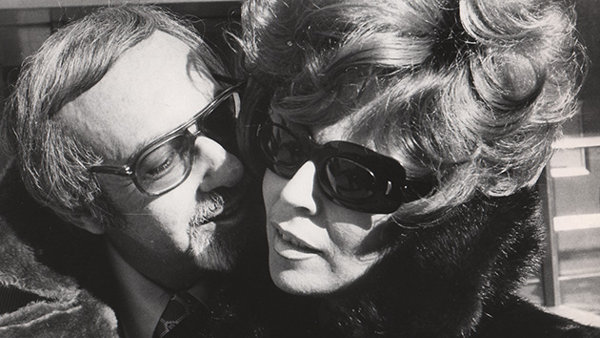Movie review by Greg Carlson
Directed by Dan Klores with Fisher Stevens, “Crazy Love” spins the almost unbelievable tale of Burt Pugach, a devilish con-man, and Linda Riss, the woman Pugach stalked and later married. Presented with the same sensational tone as the screaming late-1950s New York Mirror headlines it incorporates, “Crazy Love” parades its true-crime content as if it were dealing with a kooky romance instead of a sadistic and brutal nightmare. As documentary features go, the movie leaves out far too much to be considered truly gripping, and its unwillingness to dive beneath the surface frustrates mores than illuminates.
In the movie’s first third, which is also the strongest, a wealth of stock footage, vintage photographs and home movies, and other archival imagery is blended together to reproduce mid-20th century NYC. Ambulance-chasing negligence attorney Pugach lives the sweet life, using the income from his shady legal practice to finance powder blue Cadillac convertibles, a private plane, and even a nightclub. Despite the fact that he is married and has a severely disabled baby daughter, Pugach plays the field like a world-class lothario, initiating affairs with a parade of attractive young women. When the playboy lawyer spies movie star-gorgeous Riss, he pursues her with an intensity that should have merited a restraining order.
Despite being impressed by Pugach’s wealth and connections to celebrity, Riss insists that all bets are off until the older man finalizes a divorce. Pugach, who fibs as easily as Baron Munchhausen, draws up phony papers to appease Riss, but she exposes the ruse and breaks it off. For reasons that the movie never adequately explores, the jilted boyfriend reacts by hiring some hoods to throw lye in Riss’ face, partially blinding and disfiguring her. The melodrama is so thick to this point, that a more skillful moviemaker would have had enough material for a miniseries. Instead, Klores and Stevens are content to glide along, connecting the dots that lead to the even more outrageous revelation that Riss married Pugach following his release from prison for the crime he committed against her.
Both Pugach and Riss appear in muddy-looking talking head interviews, but neither one allows the viewer to see any deeper than the glossy surface of Riss’ dark cat glasses. Clips of the pair with Mike Douglas, Geraldo Rivera, Sally Jessy Raphael, and Joe Franklin merely reinforce the notion that the unlikely duo understands how to work with, and just plain work, the media. The moviemakers are complicit in the spin game, trading the opportunity for some claws-out discussion of Pugach’s horrific actions for total access to the subjects.
“Crazy Love” raises so many more questions than it dares to answer. By the end, when Burt and Linda are shown as a playfully bickering and bantering elderly couple, one has long given up on the possibility that the movie will reveal much about the psychology of their relationship. Letting the subjects off the hook is too easy, and the movie leaves much about gender roles and expectations unsaid. Playing the dark material for laughs, Pugach’s grotesque sense of sexual entitlement elicits nothing so much as incredulity at the notion that a victim would choose to be with the abusive gargoyle who took away her sight.
